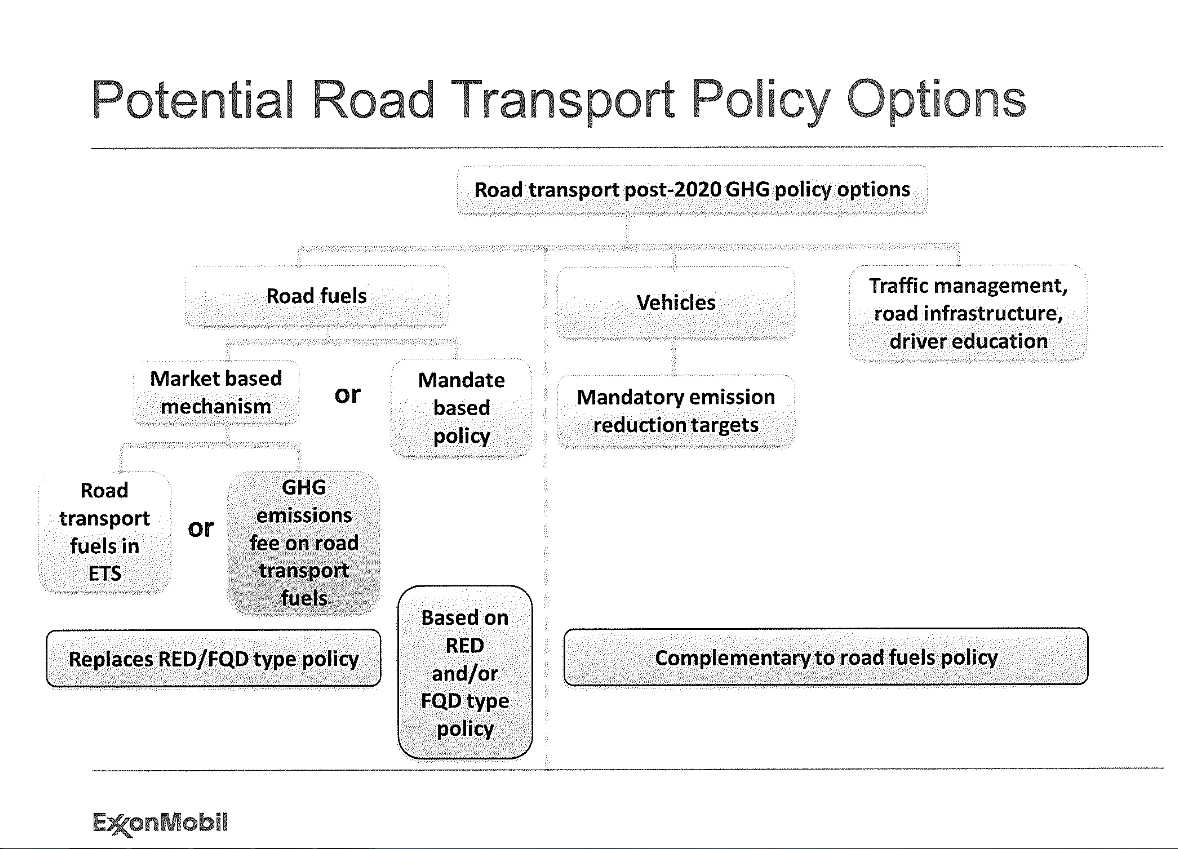Exxon lobbying: New documents reveal push against electric cars

Exxon is lobbying the UK government to stop them pushing for electric vehicles as a way of tackling climate change or air pollution, according to documents obtained under Freedom of Information rules (FOI) by DeSmog UK.
The documents reveal the firm lobbied UK transport department officials in three separate presentations given after the UK signed up to the Paris agreement on climate change last year.
Read the full story and check the latest documents on DeSmog UK here
In the presentations Exxon says: “Switching transportation from petroleum to renewable or alternative fuels is not the most cost-effective way to reduce GHG [greenhouse gas] emissions.”
The documents suggest the oil giant is broadening lobbying efforts to national governments after the EU proposed its transport strategy this summer.
EU Lobbying
Exxon’s UK lobbying mirrors documents previously obtained by Unearthed revealing the oil giant’s attempts to curtail support for electric cars at an EU level.
In a leaked lobbying document seen by Unearthed, Exxon said “other sectors are likely to provide more direct cost-effective CO2 abatement solutions than the transport sector”.
Exxon pushes instead for two different solutions to reducing emissions in transport beyond 2020 – that wouldn’t have much of an impact on emissions or oil demand.
At the time Exxon said on Twitter:
.@StollmeyerEU Setting the record straight: We are in support of lowering #emissions in transport https://t.co/6qkaLdmcsk
— ExxonMobil Europe (@ExxonMobil_EU) December 7, 2015
The EU outlined its strategy on transport decarbonisation over the summer, though it is now down to member states to agree to the strategy.
Oil industry versus electric cars
The news comes after a Koch Industries-backed campaign to rebrand fossil fuels – called Fueling U.S. Forward – was recently launched to undermine clean energy innovations including electric vehicles (also reported by DeSmog).
Last year oil and trade associations in California spent millions of dollars to kill off legislation that would have led to a significant uptake of electric vehicles in the state.
Local oil and gas companies, trade bodies and global brands – including BP, Shell, Exxon and Chevron – spent more than $22 million (£15 million) on lobbying in California last year, a record according to official figures.
Spending spiked in the third quarter of the year, when the Clean Energy and Pollution Reduction Act (SB 350) was under consideration.
The lobbying included a media campaign against the move.
In October 2015, the law passed – but without the key clause calling for a 50% reduction in petroleum use by vehicles by 2030.
Exxon lobbying
Exxon has a long history of lobbying against efforts to reduce emissions. The firm founded and funded climate science denial groups, and even tried to block US participation in the seminal Kyoto climate talks.
In its EU presentation Exxon suggests other sectors should bear the brunt of emissions reductions.
“In the near term other sectors are likely to provide more direct cost-effective CO2 abatement solutions than the transport sector,” the firm states in an Exxon-branded presentation recently (in or around September 2015) sent around to MEPs.
Adding: “Liquid petroleum fuels will remain the primary transportation fuels in the forseeable future”.
Anti-electrification
“Battery electric vehicles and fuel cell vehicles require further development and cost-reduction to be commercially viable at a large scale,” according to the leaked document.
There is also a focus on the idea of tech-neutrality and letting the market decide, rather than EU mandates such as fuel emissions and efficiency standards and the Fuel Quality Directive, which are the current tools to decarbonise transport in the EU up to 2020.
Electric vehicles are now actually reasonably competitively priced, especially on the second-hand market, though plug-in hybrids (part EV, part small petrol engine, extending range) are more expensive. Costs are coming down fast.
Post-Dieselgate several manufacturers, from VW to Tesla, have said they will push forward with affordable EVs.
Solutions

The US oil giant’s preferred option for decarbonising transport in the EU, according to the leaked EU documents, is an emissions fee linked to the EU ETS (Emissions Trading Scheme).
It’s not clear what that means in practice, but it’s likely to be a small top up on fuel tax similar to fuel duties, which already exist in many countries.
The current carbon price of 8 euros per tonne could correspond to adding only approximately 1.6 euro cents to the price of a litre, given that each litre of fuel would produce just under 2 kilos of CO2, according to a back-of-envelope calculation.
Analysts say the carbon price will be around 19 euros per tonne in 2020. At this rate, additional duty would be 3.8 euro cents per litre, adding up to only 1 euro 52 cents for a 40 litre fill up.
The policy would be very difficult to implement at EU level since fiscal measures are decided unanimously.
The second option featured in the leaked Exxon presentation is including transport emissions in the EU ETS, which currently only encompasses power plants.
The controversial proposition of rolling transport into the ETS has been championed by the German car industry including BMW, Daimler, and Opel (a German subsidiary of General Motors), as well as the German car industry association VDA, of which VW is a member.
It was also proposed last year by Denmark, which is seen as a leader on climate action in Europe. The country got a lot of flak for this idea, which it has now dropped.
The problem is that studies show policy would also not be effective in reducing transport emissions.
Cambridge Econometrics modeling concluded that the EU ETS carbon price would have to be over 200 euros per tonne in in 2020 to 2030 – “which seems implausible” – in order to get emissions down to the EU’s target of around 60g per km in 2030.
According to the study, regulateing transport emissions solely with the ETS would mean only a 1% reduction at current prices, and 3% if the EU acts to keep warming under the 2 degrees threshold.
Separate research from the International Council on Clean Transportation around the 2020 target of 95g of carbon per km came up with a similar conclusion: If you included transport emission in the ETS you would need a carbon price of 370 euros per tonne to meet the 2020 target – which will otherwise be achieved by EU mandates.

